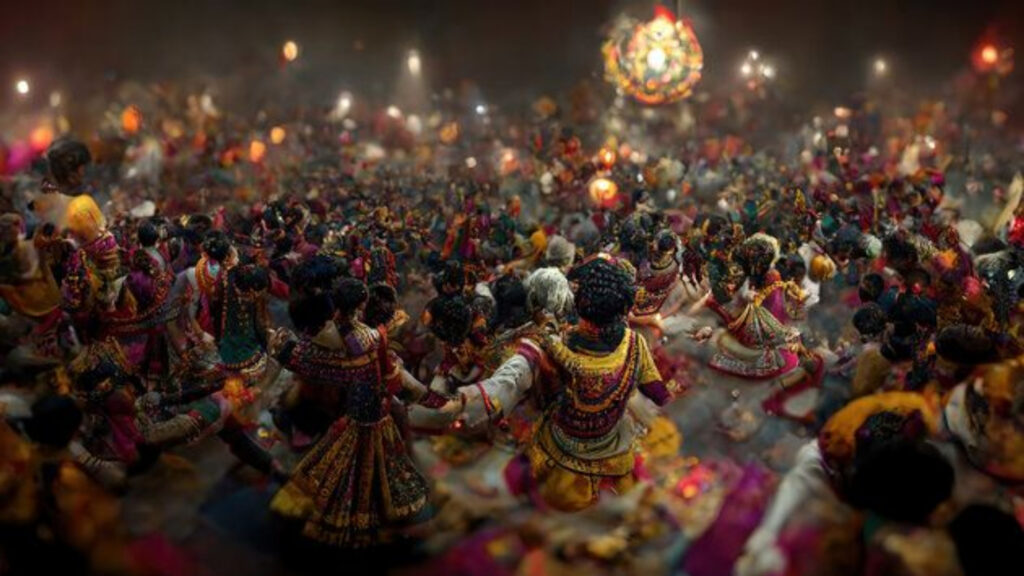
Navratri is nine days celebrating the Divine Feminine starting from the 09 to the 17th of April in 2024. Let’s explore the importance of these 9 days of Navratri.
What is Navratri?
Navratri is one of the most significant festivals celebrated by all Sanatani across the world. It is a nine-day festival in which 9 forms of Goddess Durga are Worshipped. In Sanskrit, Navratri means nine nights, these nine days are counted after the new moon day or Amavasya. The initial nine days of the lunar cycle are traditionally considered Feminine Energy. This is a significant time for Goddess Durga, who represents the nature of the divine and spirituality in nine forms. The ninth day is called Navami. The spiritual phase of the month is all about Devi. That’s why following tradition everyone worships Navami dedicated to Devi.
Importance of Navratri: The Nine Days of Divine
During these first nine days of the lunar cycle, activities like fasting, meditation, prayers, and other spiritual practices are believed to promote deep rest. Avoiding excessive gratification in worldly pleasures during this time can also aid in achieving this profound state of rest.
When we talk about “masculine” and “feminine,” we’re not referring to gender, but rather to fundamental qualities in existence. Just as day and night, darkness and light, and male and female represent these differences, masculine and feminine are qualities that exist within everything.
After the autumnal fall, the feminine aspect has a natural support. Some societies consciously emphasize the feminine during this time because the masculine tends to assert itself easily. The feminine needs encouragement to assert itself; otherwise, it fades into the background.
If the feminine aspect is pushed into the background in any society, problems can arise. They may become dominant and conquer everything, yet find themselves unsatisfied with life. This is the paradox of the masculine: reaching the peak of success but feeling empty at the top.
Also Read: The Untold Story of Navratri
Why it is considered auspicious fasting during Navratri?
Fasting during Navratri is a way to cleanse the mind and body, preparing devotees for spiritual connection and self-appraisal. Let’s explore the significance of fasting during Navratri:
- Connecting with the Divine
Fasting during Navratri isn’t just about avoiding food and water; it’s a conscious choice to distance oneself from worldly desires and distractions. People who fast during Navratri aim to turn their attention inward, focusing on self-improvement and spiritual development. They seek to connect with the divine, asking for strength and guidance from Goddess Durga.
- The Physical Benefits
While Navratri fasting is primarily about spirituality, it also offers physical advantages. Taking a break from eating allows the digestive system to rest and heal. This detox process can lead to better digestion, more energy, and clearer thinking.
During Navratri fasting, people often eat lighter, nutritious foods like fruits, nuts, and dairy. These foods are easy to digest, ensuring the body stays nourished during fasting.
- Spiritual Cleansing
Navratri fasting isn’t just about detoxing the body; it’s a journey of spiritual purification. Individuals seek to cleanse their bodies and minds by avoiding certain foods and behaviours. This process helps release negative thoughts and emotions, paving the way for spiritual growth.
- Building Discipline
Fasting during Navratri requires discipline and self-control. It teaches people to manage their cravings and desires, which can be useful in other areas of life too. This discipline extends beyond just food to thoughts and actions, leading to a more holistic transformation.
- Enhancing Meditation and Prayer
Navratri fasting often involves more meditation and prayer. With a lighter body and a calmer mind, engaging in spiritual practices is easier. This heightened awareness allows for a deeper connection with the divine, aiding in spiritual growth and self-discovery.
Struggling with Kundali Milan? Seek consultation for clarity
Nine Sacred Days of Navratri Explained
Durga, Lakshmi, and Saraswati represent different aspects of the feminine, symbolizing qualities like earth, sun, and moon, or tamas (inertia), rajas (activity), and sattva (transcendence, respectively).
People worship these goddesses based on their aspirations. Those seeking strength or power worship forms like Mother Earth, Durga, or Kali. Those desiring wealth, passion, or material gains worship Lakshmi or the sun. And those seeking knowledge, dissolution, or freedom from mortal limitations worship Saraswati or the moon.
During Navratri, each of the nine days is dedicated to one of these goddesses. The first three days honour Durga, the next three days celebrate Lakshmi, and the final three days venerate Saraswati. The tenth day, Vijayadashami marks the triumph over all these aspects of life.
Follow us on social media for cool astrology content! Get a daily horoscope, learn about the stars, and join our community! Follow us now! 🌟 on Instagram, Twitter, and Facebook
![]()

